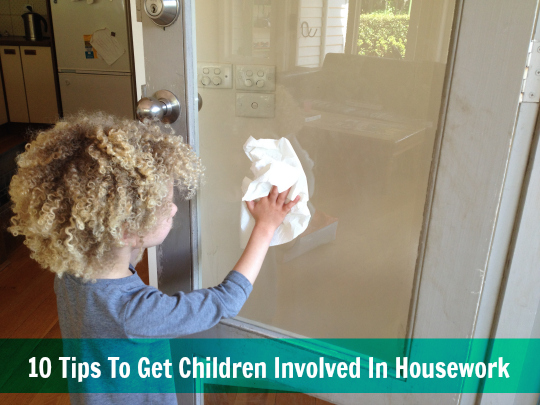My children have their set jobs which they are responsible for on a daily basis. To help them remember them, we break it down to certain times across the day:
- Kids Chores – What My Kids Do In The Morning
- Kids Chores – What My Kids Do After School
- Kids Chores – What My Kids Do In The Evening
But there are times also when I want them to give me a hand with some ad hoc housework that needs to be done. Naturally this request is not always met with glee and joy, but there are a few things that I do, which makes the process a happier and smoother one for all involved:
(1). Morning
I find that my kids are more likely to be in a helping mood in the morning that later in the day. Tiredness for the little ones is particularly a factor and for the older children they are fresher and more enthusiastic in the morning as well.
(2). Time Limit
The thought of endless cleaning or tidying is not something that brings me joy, so I can imagine it would seem like torture to the children if I suggested that we clean until everything was done!
For each child I set a time limit on how long they are expected to clean. The time varies depending upon the nature of the job and the age of the child. I tend to start with 15 minutes for the youngest and it is quite often the case that they actually want to keep working past this time.
(3). My Expectations
If I approach the communal cleaning project with the attitude that all will be completed in an orderly fashion and to a high standard, then I am going to be disappointed. The point of the communal cleaning project is to get the children contributing to the upkeep of the household, to teach them practical skills and to enjoy each other’s company.
(4). Music
Like myself, all my children love music so when we are cleaning together I let the children choose which music they would like to have on while we are working. Singing away while working, can take away some of the dullness of the job.
(5). Choice
There is generally a number of household jobs that need completing, so I like to offer the children a couple of age appropriate jobs from which they can choose the one they want to do. From this choice they feel that they are having some say in the process and are more likely to take full ownership of the the job that they choose.
(6). Demonstration
Before letting the kids start their household task, if they have not completed it before, I will take them through a very simple demonstration.
A trick which I learnt from my oldest son’s Montessori teacher in giving demonstrations to children, is not to talk too much. It is better to gain the child’s attention and allow them to watch me do the activity slowly. If I narrate each step, it can become information overload.
After the visual demonstration, I can then ask the child to break down the steps they need to do, so I can check their understanding.
(7). Autonomy
Once I have handed over the task, I need to give the child complete autonomy to do the job. There is nothing more disheartening for a child to have an adult come to them. take over the task and “show them how to do it properly”.
Going back to point three above, my expectations need to be realistic about how they will complete the task. I want the children to learn how to do these tasks properly and to do so, will more than likely need more than one attempt to get it down pat.
I can offer guidance and tips where necessary, and if I am really unhappy about the way for example the windows were cleaned, but I know the child tried their best, then I can always wait until they are in bed before I fix it up!
(8). Encouragement
I am in the encouragement camp of the praise vs encouragement debate. Encouragement focuses on the process, as opposed to the end result and does not label the child. After helping out, I want my kids to be able to make their own judgment on how they have gone.
I tend to use a before and after example to get this point across. If like in the above point they have worked on the windows, I can take them to a window that has not yet been cleaned and compare it to the one that they have worked on. I can note the hard work and patience that they put in to achieve this and reinforce how much I like clean windows!
(9). No Pay
My children receive pocket money, however it is not attached to any particular task. (For further discussion on pocket money, please read Financial Planning With Kids) So when I get my children to do extra jobs around the house, I do not pay them for it. My philosophy behind this is that they are part of the household and as such need to contribute to the upkeep and maintenance of the house.
When I am requesting their help around the house, I do not wish for it to turn into a discussion about how much each task is worth.
(10). Children’s Choice
As the children have just participated in an activity of my choice, I like to follow up communal cleaning session with a game of the children’s choice. This is generally something simple like hide and seek or maybe some wrestling.
How do you get children on board to do additional jobs around the house?

